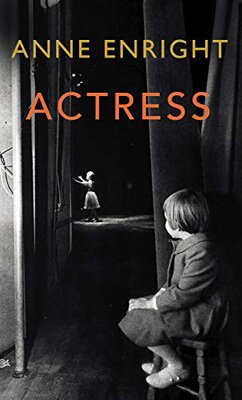I have a special fondness for novels that are about actresses/actors. Two of my favourite books are Joyce Carol Oates’ “Blonde” about the actress Norma Jean Baker who becomes the persona Marilyn Monroe and Susan Sontag’s “In America” about the Polish actress Helena Modjeska who helped found a utopian community in the late 1800s. I even wrote my MA dissertation on these novels and how both writers explore the borders between identity and performance in their stories. I also have a love for Anne Enright’s writing as few other current authors are able to write about family, love and national identity the way she can as exemplified in her previous novel “The Green Road” which is a fascinating depiction of all these things.
This means that “Actress” is the perfect novel for me and it fully delivered because I absolutely adored it. It’s told from the perspective of Norah, a writer who has written five novels and now feels ready to tell the story of her mother Katherine O’Dell who died at the relatively early age of 58. At the height of her mother’s career she was a great actress of Broadway and Hollywood and, at the lower end of it, found herself doing TV commercials and became the focus of a tabloid scandal. Though her mother’s star faded long ago and Norah herself is much older, the effects of that celebrity and the uneasy relationship it created between them are still something Norah wrestles with. In this story Norah tries to piece together a history of Katherine’s life and the real impact of her fame.
Something I find so engaging about Enright’s writing is that almost every sentence feels like it’s layered with a delicious form of irony. Norah’s backward glance at her childhood and Katherine’s life is coloured by this humorous point of view where certain things seem obvious now when they may have not been at the time. For instance, she understands now that her mother struggled with her finances though she continued to live as if she were affluent, many of the romantic men who hovered around her mother were in fact gay and when her mother made excuses for not spending time with her daughter after a show it was really because she wanted to be alone. These are things she probably intuitively knew at the time, but seeing things in retrospect makes them much clearer – or apparently so because it’s easy to place an interpretation on events which are long past. Nevertheless, I found Norah’s cynical tone about the whole artifice of fame and the theatrical world very amusing.
Part of Katherine’s struggle as an artist is that she finds herself typecast as embodying a certain romanticised view of old Ireland. Norah frequently comments on how Katherine feels pressured to uphold this image in her dress and dyed red hair. It’s upheld even more when her mother makes an advertisement for Irish butter which becomes infamous and Enright’s description of the over-the-top ad is hilarious. But it’s interesting how Katherine’s struggle to break away from this image also mirrors the country’s shifting politics and characters over the decades. Norah poignantly recounts her experiences during The Troubles and how these events make everything change but, at the same time, nothing changes: “A funny thing happens when the world turns, as it turned for us on the night we burned the British Embassy down. You wake up the next morning and carry on.” Through this story Enright gives a fascinating view on an evolving sense of what it means to be Irish.
I also really appreciate the dynamic way Enright writes about love and sex. The public endlessly speculate about Katherine’s sexual life as does Norah herself as she’s not entirely certain who her mother slept with or who her own father is. But the reader is drawn more into Norah’s own sexual history and relationship with sex as she describes her uninhibited views about it. When pondering the nature of sex she poignantly describes the complicated interplay between the imagination and reality and points out that there is a “difference between what happens in your head and what happens in the room. The big difference.” Interestingly, the novel is largely narrated in the second person as Norah is directing her recollections at her husband with whom she has a very complicated relationship.
Finally, I very much enjoyed the occasional commentary Enright makes about sleep and sleeplessness throughout the novel. She makes very relatable points about the inner struggle everyone has when waking up in the night and whether to go to the toilet or try to get back to sleep. I also liked her observation about how uncomfortable a bed feels when you’re trying to get to sleep but when you wake up in the morning it feels like the most comfortable place in the world. Enright excels at such pithy down-to-earth observations while also creating a larger family story with compelling ideas about identity. It’s what makes reading this author such an enriching and enjoyable experience.








